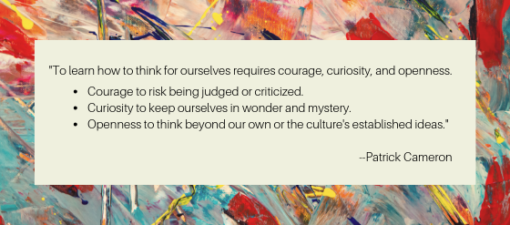
We all think, every minute of every waking hour. Thinking is an internal mental process that takes the data and information received through our senses and combines the new information into our existing store of learned information. This activity can lead to either the formation of new knowledge, modified knowledge, or be disregarded as irrelevant. It may change or strengthen our view of the world or our beliefs, opinions, attitudes, and behaviors. It is the process by which we reason, reflect, decide, ponder, judge, evolve, believe, remember, visualize, or imagine possibilities. It allows us to model the world according to our personal goals, plans, and desires.
However, if we just assimilate information without critically analyzing our thought processes and accept information on its face, our thinking will remain shallow and superficial. This more surface-level thinking depends on previously seen patterns based on our past experiences to make sense of data. If we never question those patterns, look for additional data, or re-examine the meaning of the data, our thinking will tend to be biased, distorted, partial, uninformed, and can be very prejudiced. Decisions get made based on intuition, “gut feelings”, and emotions, rather than logical, factual data.
However, a deeper, more critical type of thinking, is based on our analysis of a concept or thought. It applies objectivity by adding a full range of possibilities to a problem, including emotional, cognitive, intellectual, and psychological factors. We ask questions to better understand a concept, a thought, or to solve a problem. We make decisions based on validated facts and logic. But how do you develop a more critical thinking approach? Here are the 7 habits I think will help you be a highly effective thinker.
1. Be Open Minded
Seek to elicit and understand various perspectives from multiple sources. The truth should be more important to us than our egos and the views we currently hold, no matter how valued. Accept other views, as well as challenge others to see all perspectives as a means of generating more options and possibly a new view. The key is not to debate right or wrong, but to see and understand multiple viewpoints.
2. Be Inquisitive
They say “curiosity killed the cat,” but in this case, curiosity is of extreme value. Be curious about a wide range of topics and issues. Ask questions to further your understanding. By being curious, you will be able to see new worlds and possibilities which are normally not visible. It takes a curious mind to look below the surface and discover these new worlds and possibilities.
Learn more about our 1-day Critical Thinking Skills course
3. Be a Life-Long Learner
Make an effort to read and educate yourself, gathering information that may be important for making decisions now and in the future. Read things that expand your mind, including opposing thoughts to see the entire range of ideas. Proactively seek out new knowledge. Be willing to look beyond what you know, consider new ideas, and try new things.
4. Be Self-Reflective
Be aware of your own thought processes and critically reflect on them. Be sensitive to your own biases and ask yourself tough questions: “Do I have all the necessary information I need to make a decision? Are my conclusions true, and if so, what are the likely implications?” And, often the hardest question to ask yourself: “Do I need to change my view given the additional data and facts?”
5. Practice Active Listening
Make a conscious effort to hear not only the words another person is saying but, more importantly, the actual message they are trying to communicate. This means you can’t talk to yourself at the same time, become distracted by whatever may be going on around you, or by form opposing arguments while the other person is still speaking. As much as we like to think we can multi-task (talk to ourselves and listen at the same time), research suggests otherwise. You are either fully present and listening or you are not listening.
6. Be a Skeptic
Carefully evaluate new information with a critical lens. Don’t take the information for granted. Take as much time as you need to gather the information you need to better understand a complex situation before taking action. Don’t take things at face value. Check the facts!
7. Be Humble
Put aside your ego to recognize that you do not need to have all the answers (no one does), that you are not always right (hard pill to swallow – I know, because I love being right), and that sometimes you may make a mistake or two – own it.
Upcoming blogs will further explore and focus on five different types of thinking: strategic, critical, systems, creative, and design thinking.

 New Horizons
New Horizons
 Project Management Academy
Project Management Academy
 Six Sigma Online
Six Sigma Online
 Velopi
Velopi
 Watermark Learning
Watermark Learning
 Login
Login




 New Horizons
New Horizons
 Project Management Academy
Project Management Academy
 Velopi
Velopi
 Six Sigma Online
Six Sigma Online
 Watermark Learning
Watermark Learning